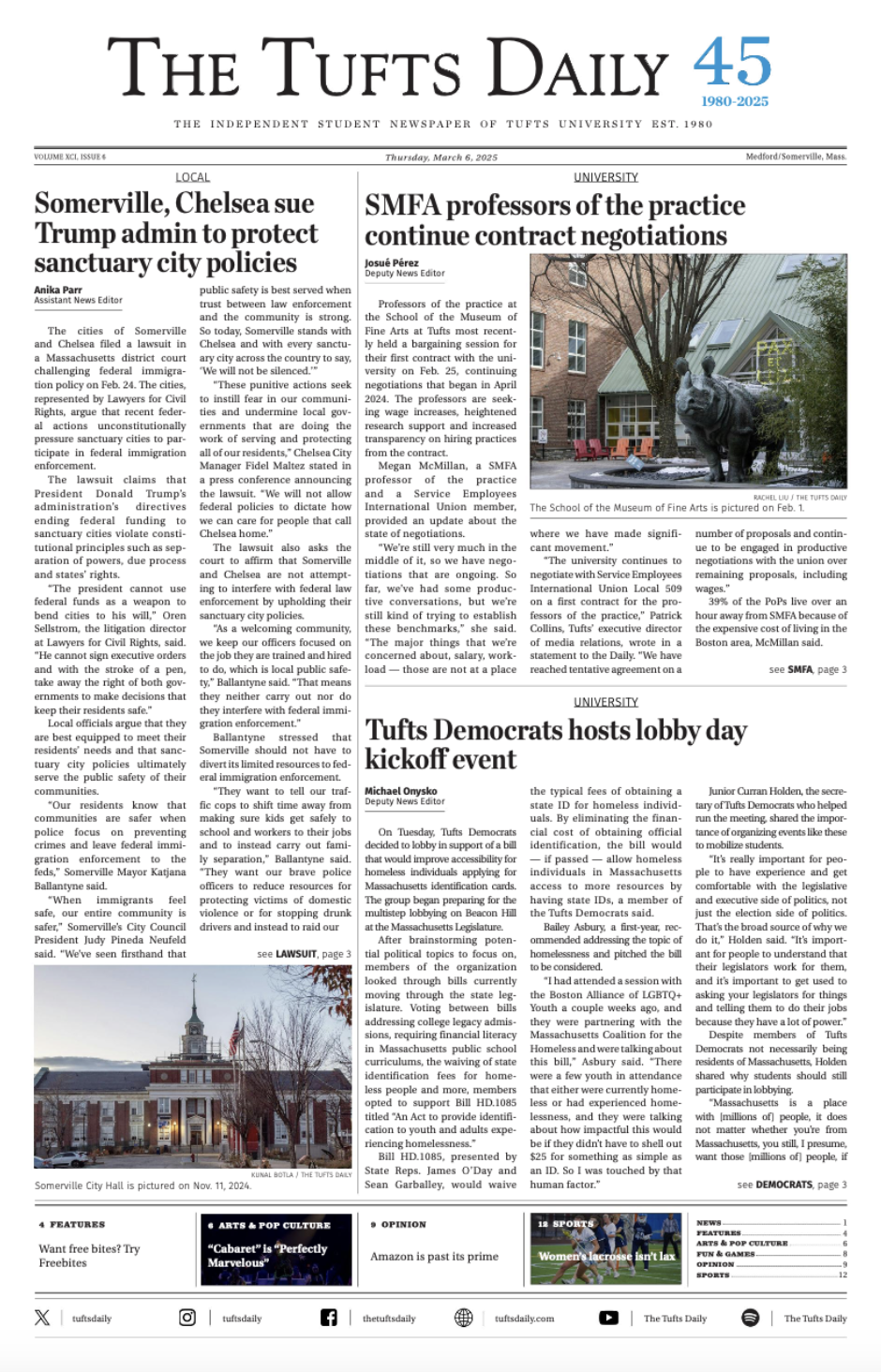I was frustrated to read the Tufts Daily editorial "Too Soon for Tufts to scrap Early Decision," which reeked of jealousy toward Harvard.
Why must Harvard be a "constant source of residual bitterness among Tufts students"? Why is Harvard's decision to drop its early admission program a "one-up" over Tufts? The elimination of early admissions is an admirable step on Harvard's part. In fact, Harvard is probably the only institution in the U.S. that could pull off such a feat.
But Harvard's excellence does not diminish Tufts' reputation or ability to provide for an excellent education. Tufts is a very different institution from Harvard - why must we continue to compare ourselves to our neighbor in Cambridge?
Rather, let us accept that Harvard has made an impressive move, one that only it and maybe three other schools could pull off. Abolishing early admissions is an important step in increasing the accessibility of the top universities to the most talented students across the country, regardless of their access to posh private schools or privately-hired personal college admissions consultants.
I understand that, for many college applicants, early admission programs provide an advantage in a hyper-competitive market. But, as has been previously pointed out, these programs give advantages to the already advantaged.
Personally, neither I nor my brother could apply early to any university, because we would not have been able to compare financial aid packages. In fact, I had to negotiate with the financial aid office to increase my yearly grant before I could send my deposit to Tufts. My family is hardly poor, but the $40,000 a year price tag of a private education is enough for anyone, apart from the most affluent, to balk at the cost.
Applying regular decision to competitive universities like Tufts places students from average and more modest backgrounds at a significant disadvantage. As the Daily pointed out, nearly a third of Tufts' incoming class is admitted through Early Decision. I understand that Tufts and other universities want to secure the most talented students early on in the cycle - it certainly doesn't hurt their U.S. News ranking. But Early Decision seems to take for granted that the most talented students are also the wealthiest ones.
So let's look at the situation. In regular decision, a much larger applicant pool is vying for a smaller number of available slots. Additionally, as Tufts is not need-blind, the student's ability to pay is factored into the admission decision. This makes it difficult for students from an average background to be admitted, let alone be able to attend. Such a system predetermines that some of the nation's best schools are effectively cut off from all but the wealthiest students.
Tufts' commitment to public service and positive social change was one of the reasons I wanted to attend in the first place. But, for a school that is so dedicated to changing the world and so diverse in geographical and ethnic backgrounds, the student body is exceedingly financially homogenous.
I was raised in an affluent Dallas suburb; never in my life did I feel poor, until I came to Tufts. I was shocked to find a large number of students who had never heard of a FAFSA and were not worrying about loan debts after graduation. I felt like many of my fellow students had come from another planet where money was not a worry.
I know Tufts' inability to provide need-blind admissions and guaranteed financial aid is not necessarily tied to Early Decision. And I am pleased that the current administration has placed a high priority on raising more funds for financial aid. Such steps will only be in Tufts' best interests, as has been previously discussed. But, certainly Early Decision is an important factor in keeping Tufts - and other schools of its level - largely a bastion of the wealthy.
I do understand the rationale that Early Decision keeps talented students attending Tufts, instead of hopping off to Duke, Stanford or elsewhere. If it is so important that Tufts keep admitting students in December and providing them with a sense of security, then a non-binding Early Action program is in the university's best interest.
Early Action can continue to reward students whose first choice is Tufts while not forcing them to accept whatever financial package is handed to them. Admissions can identify the students who truly want to be at Tufts - no matter what their financial status.
The higher education community is waiting to see who will follow Harvard and do away with early admissions, binding or not. If Tufts were to be the second major university to only use regular decision, it would likely be greeted with praise for its courage. Think of the positive press! The students who would never have heard of Tufts discovering this great institution! Tufts could take a risky, but beneficial, stand against the admissions "game."
I can already hear the cries of "But we would look like a bunch of Harvard copy cats!"
Harvard is a worldwide heavyweight with an endowment that surpasses the GDP of most small countries. The world only needs a limited number of academic behemoths. Tufts is excellent at what it does: providing an excellent liberal arts education with a decidedly international perspective.
I am not saying we should abolish early admissions in order to keep up with Harvard. We should abolish early admissions because it is right.





